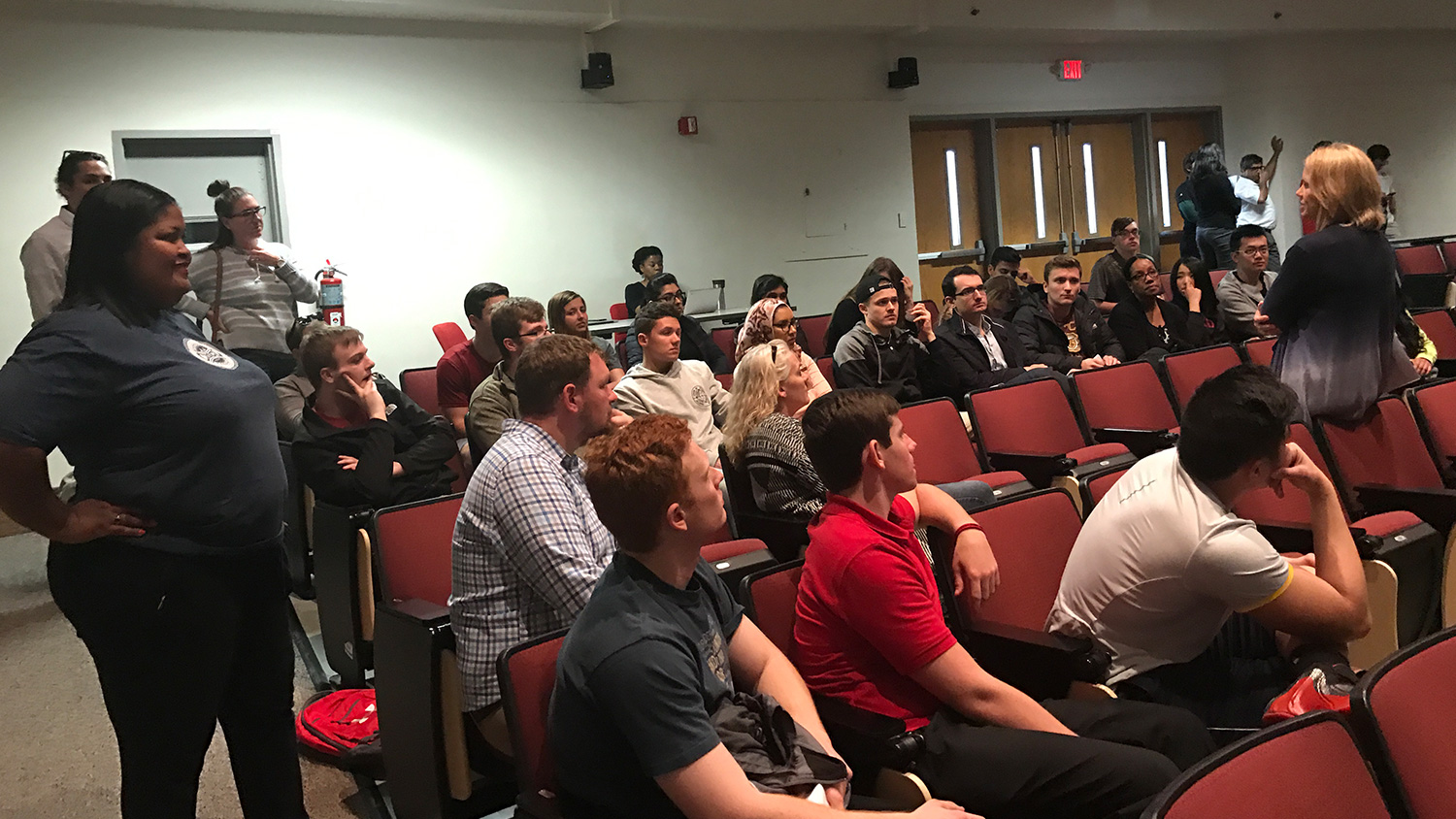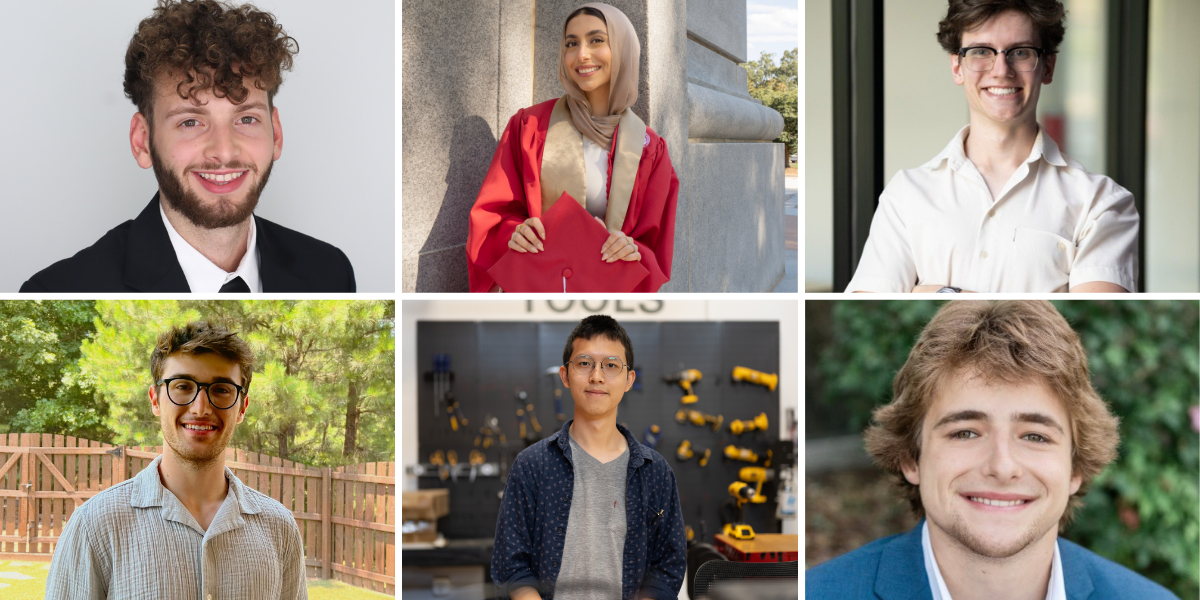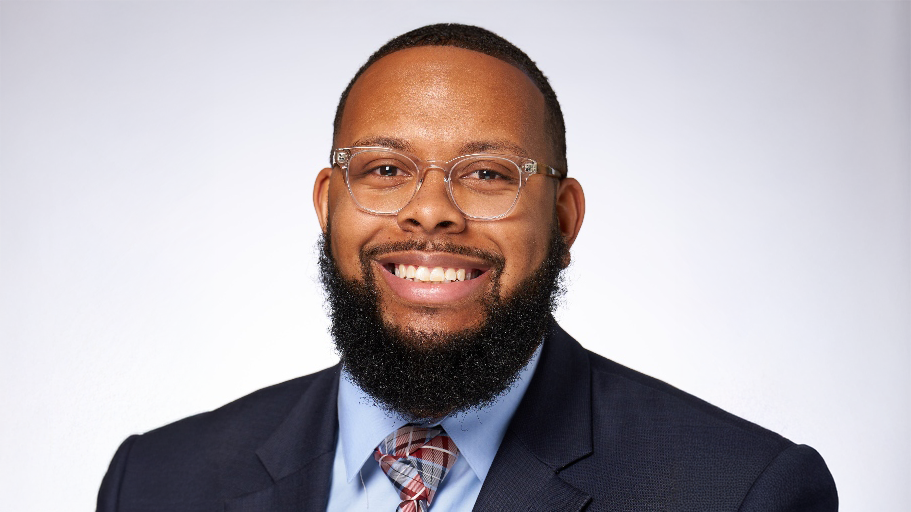Poole College Alumni Challenge Assumptions during Inclusive Mindset Workshops

“I believe students need to hear from real companies – whom they recognize as industry leaders – that advance cultural competence is expected of them to work productively in the modern workforce,” said Tayah Lyn Butler, director of diversity and inclusion at the NC State Poole College of Management. “To deliver this message, I invited two teams from highly respected companies to teach the workshops here in Poole College during Diversity Education Week at NC State.”
The first team, from Cisco, presented on Tuesday, March 21; a team from EY is presenting on Friday, March 24.
“Many companies claim they value diversity in their employee ranks, but there is a very visible difference between talking about the value of diversity and taking the steps to create an inclusive work environment for their diverse employees,” Butler said. “Cisco Systems and EY are examples of gold standards in their talk and their actions.”
The Cisco team – six human resource professionals and volunteers in other roles at the company – launched a discussion on the topic of assumptions, working with about 100 first-term students in Monday’s session of Poole College’s introductory M100 course.
LaTricia Frederick, MBA, SPHR, global program manager for inclusion and collaboration at Cisco and Monday’s lead workshop presenter, got the conversation started with a few examples that showed what unconscious bias is and how common it is in human nature.
Unconscious bias, also knowns as implicit social cognition, refers to attitudes or stereotypes that affect our understanding, actions and decisions in an unconscious manner, Butler said, citing a definition from the Kirwan Institute at The Ohio State University. Examples discussed at the Poole College presentation included instances of misjudging a non-communicative person in an adjacent airplane seat or making assumptions about relationships among individuals in various settings.
Conversation among students and presenters picked up after Frederick showed a video clip of a BBC interview regarding the impeachment of South Korea’s President Park Geun-hye. The interview, conducted live via Skype at the home of Robert E. Kelly, originally from the United States and now a political science professor at Pusan National University in South Korea, went viral because his two young children came charging through their dad’s office door in the midst of the interview. He had forgotten to lock the door before beginning the interview. View the BBC interview video.
The humorous episode provided a icebreaker for the students, but that’s not why the workshop presenters showed it.
Also shown on the video was the quick action of Kelly’s wife and the children’s mother, Kim Jung-A. However, because she was South Korean, not American like her husband, some news reports referred to her as the nanny.
“The ensuing discussion among the workshop participants focused on how as individuals we need to continually work on becoming aware of our unconscious bias and how it presents, at times, with stereotypes. When those stereotypes are negative we are prone to inflict harmful microaggressions on others based on what we can visibly see about them,” Butler said. In subsequent interviews, the couple did say the incorrect reference was hurtful.
The workshop presenters also focused on micro aggression, defined as a subtle but offensive comment or action directed at a minority or other non-dominant group that often unintentional or unconsciously reinforces a stereotype, such as saying, “I don’t see you as black.” It includes the act of discriminating against a non-dominant group by means of such comments or actions, Butler explained, citing a basic definition in dictionary.com.
To illustrate micro aggressions, Frederick showed a second video, “I Am Not Black, You Are Not White,” by American musician Richard Williams, aka Prince Ea. Ea, who graduated magna cum laude from a full scholarship at the University of Missouri St. Louis with a bachelor’s in anthropology, is known for creative inspirational and thought-provoking content.
Working in small groups with the other Cisco volunteers, the students were asked to come up with a song title that reflected their thoughts on perceptions. Among their responses included: “Imagine” by John Lennon and “Just the Way You Are” by Bruno Mars.
The session wrapped up with an invitation for the students to join Cisco’s Spark site, where they could continue conversations about how to reduce unconscious bias in their everyday behaviors, share related content with one another, as well as potentially explore internships and career opportunities at Cisco, a company dedicated to creating an inclusive work environment for the global workforce it employs. View Cisco systems statement on inclusion.
About the presenters
Three NC State alumni were among six presenters at this first in the series of Diversity in Education Inclusive Mindset Workshops for Poole College students.
LaTricia, MBA, SPHR, global program manager for Cisco’s Inclusion and Collaboration group, said the workshop “was wonderful for me. It fills me up to be able to give back and share what I’ve learned with people who are in the same seat that I was in 20 years ago, sitting right about there (she said, pointing to a seat in the first few rows of the Nelson Hall auditorium), when I was a junior in the college. She graduated with her bachelor’s degree in business management in 1999, and received her MBA from Meredith College in 2004.
While her current role at Cisco focuses on inclusion and collaboration Frederick said, “I’ve always given back from a diversity and inclusion (perspective), no matter what role I was in.” Prior to her current position, she worked in human resource management and business roles. “When I was offered the opportunity to do this full time,” she said she was ready for it. “It’s a passion.”
Frederick now applies that passion to help the company recruit, develop and retain diverse talent, enabling people to have long-lasting careers, breaking down barriers and success. She offers her Twitter handle – @ltfrederick – for those who would like to follow her.
Frederick said that she herself is “the product of someone who invested in me” at prior positions in IBM, MCI and Duke University. One of those was Clint Davidson, who retired from Duke and joined Poole College as a lecturer in human resources several years ago.
“He was my executive sponsor when I was at Duke,” she said, “the first person to hire me for a full time job.” She also was Davidson’s INROADS intern while at Duke, and now is an adjunct professor at the University of Maryland University College, in addition to her role at Cisco.
“The NC State and Poole College experience set the foundation for my career in business,” Frederick said. “From learning the basics of Microsoft Office – back then, a really big deal – to learning how compensation structures worked, I have been successful in my career because of the excellent professors, projects and student peers who challenged me in preparation for the “real” world. I am honored to have the opportunity to return to my alma mater and share what I’ve learned.”
Christina Moss Frederick (no relation), who received her bachelor’s degree in business management at NC State in 2009 – the year before Poole College was named – was another of the professionals volunteering at the March 20 session. She currently is a global talent acquisition specialist at Lenovo and is slated to complete her master’s degree in counseling through NC State’s College of Education in May 2017, and is in the Global Future Leaders program at Lenovo.
Another Poole College alumna helping with the session was Aleta Howell, who received bachelor degrees in business and economics in 1989, when those programs were part of the College of Humanities and Social Science, prior to the start of the college of management at NC State. She also received her MBA from the University of North Carolina at Chapel Hill.
EY is presenting the college’s second Inclusive Mindset Workshop for another group of M100 students on Thursday. Watch for an update from that session.
- Categories:


